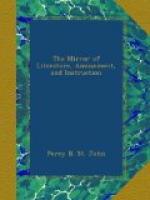THE BLIND BEAUTY OF THE MOOR.
(A Fragment.)
To thee—O palest phantom—clothed in white raiment, not like unto a ghost risen with its grave-clothes to appal, but like a seraph descending from the skies to bless—unto thee will we dare to speak, as through the mist of years back comes thy yet unfaded beauty, charming us, while we cannot choose but weep, with the self-same vision that often glided before us long, long ago in the wilderness, and at the sound of our voice would pause for a little while, and then pass by, like a white bird from the sea, floating unscared close by the shepherd’s head, or alighting to trim its plumes on a knoll far up an inland glen! Death seems not to have touched that face, pale though it be—life-like is the waving of those gentle hands—and the soft, sweet, low music which now we hear, steals not sure from lips hushed by the burial-mould! Restored by the power of love, she stands before us as she stood of yore. Not one of all the hairs of her golden head was singed by the lightning that shivered the tree under which the child had run for shelter from the flashing sky. But in a moment the blue light in her dewy eyes was dimmed—and never again did she behold either flower or star. Yet all the images of all the things she had loved remained in her memory, clear and distinct as the things themselves before unextinguished eyes—and ere three summers had flown over head, which, like the blossom of some fair perennial flower, in heaven’s gracious dew and sunshine each season lifted its loveliness higher and higher in the light—she could trip her singing way through the wide wilderness, all by her joyful self, led, as all believed, nor erred they in so believing, by an angel’s hand! When the primroses peeped through the reviving grass upon the vernal braes, they seemed to give themselves into her hand; and ’twas thought they hung longer unfaded round her neck or forehead than if they had been left to drink the dew on their native bed. The linnets ceased not their lays, though her garment touched the broomstalk on which they sung. The cushat, as she thrid her way through the wood, continued to croon in her darksome tree—and the lark, although just dropped from the cloud, was cheered by her presence into a new passion of song, and mounted over her head, as if it were his first matin hymn. All the creatures of earth and air manifestly loved the Wanderer of the Wilderness—and as for human beings, she was named, in their pity, their wonder, and their delight, the Blind Beauty of the Moor!
She was an only child, and her mother had died in giving her birth. And now her father, stricken by one of the many cruel diseases that shorten the lives of shepherds on the hills, was bed-ridden—and he was poor. Of all words ever syllabled by human lips, the most blessed is—Charity. No manna now in the wilderness is rained from heaven—for the mouths of the hungry need it not in this our Christian land. A few goats feeding among the rocks gave them milk, and there was bread for them in each neighbour’s house—neighbour though miles afar—as the sacred duty came round—and the unrepining poor sent the grateful child away with their prayers.




